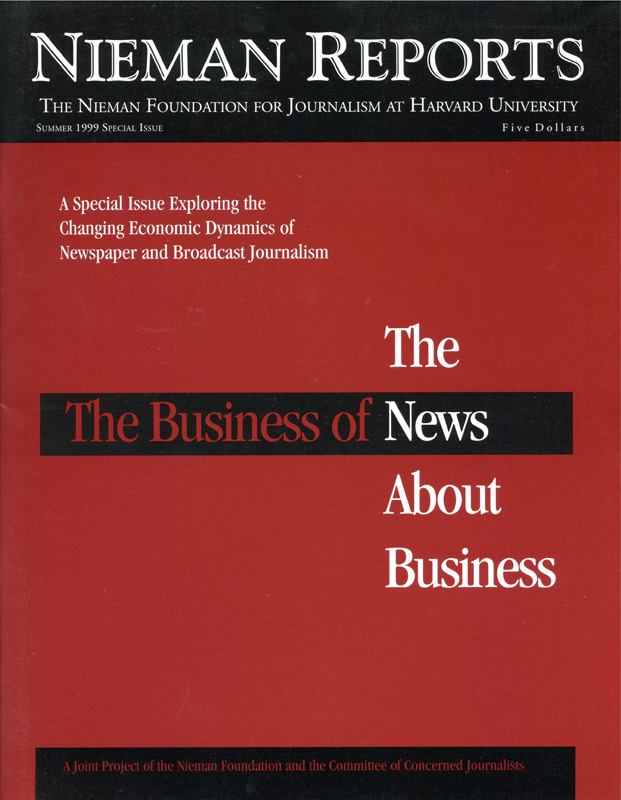
The Business of News, The News About Business
This special issue of Nieman Reports has been created to report to the readers of Nieman Reports, to members of the Committee of Concerned Journalists, and to newspaper and broadcast communities on two recent reports, as well as to share relevant insights from other Committee members.
A joint project of the Nieman Foundation and the Committee of Concerned Journalists.
Before you can discuss what might be done [with newspapers] you have to look at the business proposition that you’re dealing with…. The people who own these journalistic institutions, by and large, are large companies…in which these journalistic institutions play a smaller and smaller role and don’t contribute the same profit margins as, say, local TV stations do, which contribute roughly between 40 and 50 cents on every dollar they take in [as] pure profit. And they don’t contribute what cable does or what some of the programming of software or other parts of the business do. So…increasingly these companies…look to their audience as being Wall Street. “What is the shareholder value we’re getting?” [This] is the same question a widget company asks.
So if you’re going to request of them or demand of them to change, you somehow have to deal with this equation. How do you get [these owners] to change their value system [when] basically…what matters [to them] is how do I maximize my profits to shareholders? That, they say, is their fiduciary responsibility. We come back and we say…“Look, that is not your only responsibility. You have some public trust obligations. You have some responsibilities to your community, you have some responsibility to your employees. It’s a multiple.” But you have to first address that question of how do you, Mr. Shareholder or Mr. Owner or Mr. CEO, change your value system or at least alter it [in] some way.
These remarks are edited from a public forum sponsored by the Committee of Concerned Journalists and the University of Southern California’s Annenberg School for Communication on March 4, 1998. Ken Auletta is the author of “The Highwaymen: Warriors of the Information Superhighway” (1997, Random House), and writes the “Annals of Communication” for The New Yorker magazine.
So if you’re going to request of them or demand of them to change, you somehow have to deal with this equation. How do you get [these owners] to change their value system [when] basically…what matters [to them] is how do I maximize my profits to shareholders? That, they say, is their fiduciary responsibility. We come back and we say…“Look, that is not your only responsibility. You have some public trust obligations. You have some responsibilities to your community, you have some responsibility to your employees. It’s a multiple.” But you have to first address that question of how do you, Mr. Shareholder or Mr. Owner or Mr. CEO, change your value system or at least alter it [in] some way.
These remarks are edited from a public forum sponsored by the Committee of Concerned Journalists and the University of Southern California’s Annenberg School for Communication on March 4, 1998. Ken Auletta is the author of “The Highwaymen: Warriors of the Information Superhighway” (1997, Random House), and writes the “Annals of Communication” for The New Yorker magazine.


